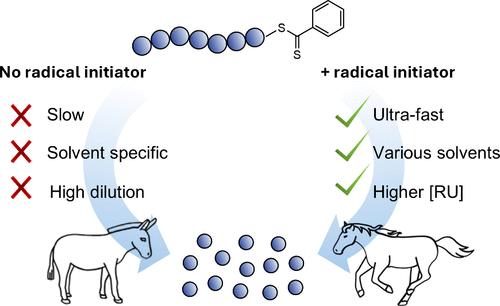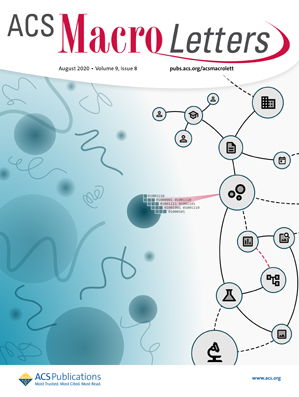Ultrafast Thermal RAFT Depolymerization at Higher Solid Contents
IF 5.2
Q1 POLYMER SCIENCE
引用次数: 0
Abstract
Although thermal solution RAFT depolymerization has recently emerged as an efficient chemical recycling methodology, current approaches require specialized solvents (i.e., dioxane), typically suffer from extended reaction times, and operate exclusively under highly dilute conditions (i.e., 5 mM repeat unit concentration). To circumvent these limitations, a commercial radical initiator is introduced to kinetically untrap the depolymerization and promote chain-end activation. By varying the initiator concentration, a remarkable rate acceleration (up to 72 times faster) can be observed, enabling the completion of the depolymerization within 5 min. Notably, a 20-fold increase in the repeat unit concentration did not appreciably compromise the final depolymerization yield, while very high percentages of monomer could be recovered in a wide range of solvents, including dimethyl sulfoxide, anisole, xylene, acetonitrile, toluene, and trichlorobenzene. Our findings not only offer intriguing mechanistic aspects, but also significantly expand the scope and applications of thermal RAFT depolymerization.

高固体含量下的超快热RAFT解聚
虽然热溶液RAFT解聚最近成为一种有效的化学回收方法,但目前的方法需要专门的溶剂(即二恶烷),通常需要较长的反应时间,并且只能在高度稀释的条件下操作(即5毫米重复单位浓度)。为了克服这些限制,引入了一种商业自由基引发剂来动力学地解开解聚并促进链端活化。通过改变引发剂浓度,可以观察到显著的速率加速(高达72倍),使解聚在5分钟内完成。值得注意的是,重复单元浓度增加20倍并没有明显影响最终的解聚收率,而在多种溶剂中,包括二甲亚砜、苯甲醚、二甲苯、乙腈、甲苯和三氯苯,可以回收非常高百分比的单体。我们的发现不仅提供了有趣的机理方面,而且显著扩展了热RAFT解聚的范围和应用。
本文章由计算机程序翻译,如有差异,请以英文原文为准。
求助全文
约1分钟内获得全文
求助全文
来源期刊
CiteScore
10.40
自引率
3.40%
发文量
209
审稿时长
1 months
期刊介绍:
ACS Macro Letters publishes research in all areas of contemporary soft matter science in which macromolecules play a key role, including nanotechnology, self-assembly, supramolecular chemistry, biomaterials, energy generation and storage, and renewable/sustainable materials. Submissions to ACS Macro Letters should justify clearly the rapid disclosure of the key elements of the study. The scope of the journal includes high-impact research of broad interest in all areas of polymer science and engineering, including cross-disciplinary research that interfaces with polymer science.
With the launch of ACS Macro Letters, all Communications that were formerly published in Macromolecules and Biomacromolecules will be published as Letters in ACS Macro Letters.

 求助内容:
求助内容: 应助结果提醒方式:
应助结果提醒方式:


